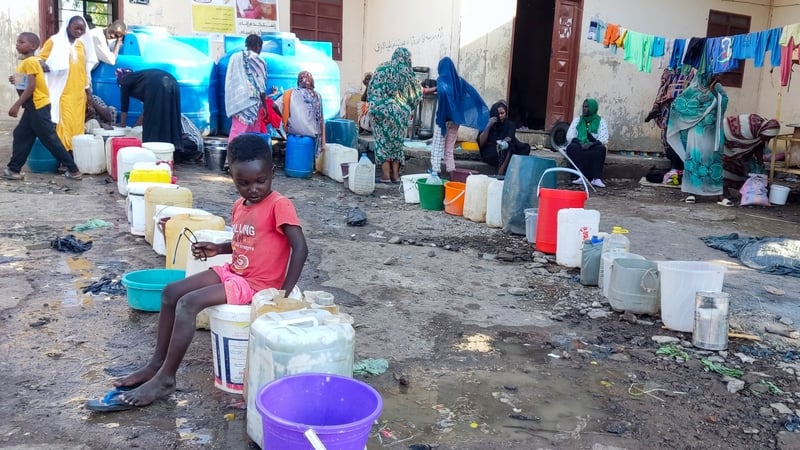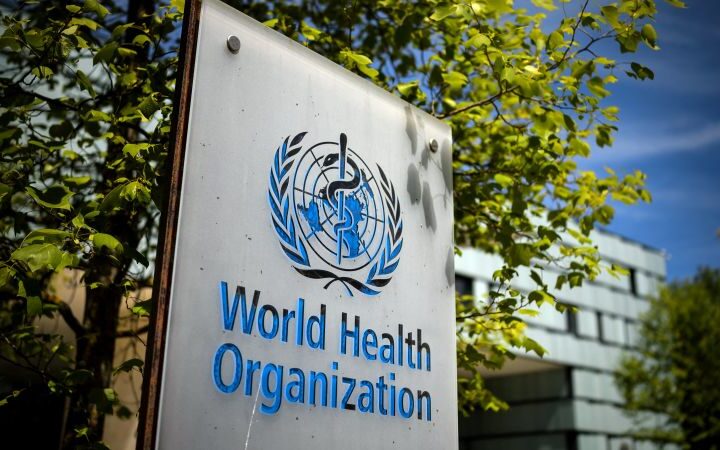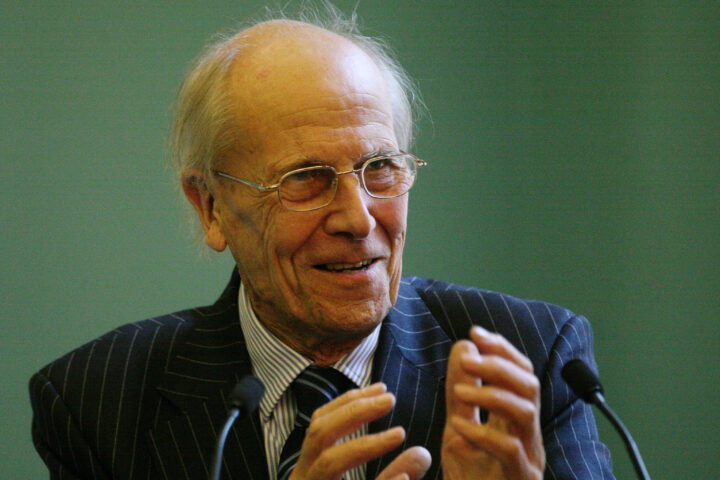US aid funding cuts have had a devastating impact on Irish aid agencies working in developing countries, according to documents seen by RTÉ News.
The documents also reveal the cloud of uncertainty that has overshadowed Irish non-governmental organisations (NGOs) in the days and weeks following US President Donald Trump’s executive order to freeze and terminate foreign aid funding.
As the Trump administration’s review of US foreign aid officially finishes this weekend, Irish aid agencies are already grappling with job losses, the suspension of overseas programmes and the uncertainty over future operations.
The United States Agency for International Development (USAID) was widely considered one of the largest foreign aid donors in the world before it was effectively dismantled by the Trump administration in January.
Released under Freedom of Information, emails and briefing notes show how the Department of Foreign Affairs (DFA) kept in contact with Ireland’s aid agencies as tens of millions of euro in funding appeared to essentially disappear.
Hundreds of redundancies have been reported across the Irish aid agency sector and development projects in countries such as Sierra Leone, Somalia and Syria have been significantly affected.
GOAL and Concern were the largest recipients of US government funding, with annual income of €103 million and €58.3 million from USAID respectively. Trócaire received €1.38m from USAID and Self Help Africa received €308,000.
According to the documents, GOAL’s Turkey-Syria programme was most impacted as 85% of it is funded by USAID.
Trócaire had USAID grants in Somalia, Sierra Leone, Honduras and Malawi, and the largest impacts have been felt by several of their local partners, some of whom are up to 80% funded by USAID or UN programmes funded by USAID.
As a result of the funding freeze, Self Help Africa decided to pull its services out of three African countries by the end of the year.
Concern confirmed that it has lost over €20 million in funding from the US government.
Programmes affected include assistance to nearly a quarter of a million people in Democratic Republic of Congo, cash assistance to around 138,000 people in hard to reach parts of Sudan, efforts to help communities in severely flood affected areas of Pakistan, and those lacking basic sanitation in five counties in Liberia.
Concern also received support from USAID for its organisational overhead costs which, it predicted, will cause “significant implications” for Concern’s US and Ireland offices.
Ahead of his St Patrick’s Day visit to the United States, Taoiseach Micheál Martin also received a briefing note from the DFA highlighting that the “impact of US decisions is expected to be particularly pronounced in the areas of global health, gender equality, governance, and human rights”.

Uncertainty and confusion
Mixed messaging and a lack of communication from US officials fuelled uncertainty and confusion amongst Department of Foreign Affairs officials and aid agencies in the first few weeks after the Trump administration’s decision.
Some charities had decided early on to re-evaluate the future of their projects.
A few days after Mr Trump’s executive order in January freezing all US foreign assistance for 90 days, Concern received letters from their local delegations and the US office in relation to funding.
According to notes of a call between Department of Foreign Affairs officials and Concern, the freeze impacted €63m of Concern’s US government funding contracted and committed for 2025.
By the end of January, Concern had made the decision to issue guidance to stop activities, freeze recruitment and not incur major procurement. It had also decided initially to cover costs from other income streams to offset the 90-day suspension in funding, to avoid contractual and potential legal repercussions and also redundancies.
During an ‘introductory’ meeting with the new Minister of State for International Development and Diaspora, Neale Richmond, on 7 February, representatives from Trócaire, GOAL, Concern and Self Help Africa highlighted the severe impacts the USAID funding freeze was having on the charity sector.
Concern said aid agencies were facing “its greatest funding gap” while Self Help Africa highlighted a “systemic threat”.

“It noted that if the suspension of US funding becomes permanent, no other donor will be able to fill the gap. This will have serious ramifications for Concern’s own work, and in particular the work of the US humanitarian organisations such as Catholic Relief Services, as the highest recipient of grants from USAID,” according to department officials summary of the meeting on 26 February.
DFA officials said some organisations were also reporting “significant difficulties” in contacting USAID.
A clearer picture of consequences
While the funding review is due to be completed this weekend, the US government had issued termination notices to its partners, including Irish NGOs, at the end of February (Concern later said that some termination letters were rescinded).
However, by that time many charities had made “difficult decisions” on their programmes and structures.
In the closing days of February, officials at the DFA said that Trócaire had told them that the suspension of aid and certainty of significant cuts had “created chaos around the world for individuals, communities, organisations and governments”.
In an email to a DFA official on 21 February, GOAL said it had been forced to make “the very difficult decision” to temporarily suspend some programmes and that reductions will have a “global impact” including at GOAL HQ.
DFA officials said: “GOAL is faced with some difficult organisation choices. It is understood that senior management has had at least two meetings with its board in the past week.”
Throughout spring, it appears that Irish NGOs struggled to get clarity and answers from US authorities about their promised financial support. No Irish NGO had received USAID funding since its suspension, according to the documents.
While GOAL and Concern hoped that they would be granted waivers from the US government, by February these hadn’t materialised.
A “rolling brief” prepared on the ‘Impact of USAID Funding Freeze on NGO Partners’ said that: “It is clear that the suspension of USAID funding is presenting significant organisational and operational challenges for Irish NGOs.”
Meanwhile, documents show a commitment from Irish officials that the Government would not pull its funding as the impact of cuts from United States, United Kingdom, Netherlands, Germany, Finland and France were felt.

A warning from Irish Aid
The gravity of the situation was highlighted by Irish Aid’s Director General when he warned in a “brutal truth” email in February that some of its international funding partners may not survive 2025 due to the impact of sweeping aid cuts.
In an email to 27 Irish missions on 28 February, Irish Aid DG Michael Gaffey predicted that the impact of USAID cuts across the international development and humanitarian system “will be massive”, and this was compounded by similar foreign aid budgetary reductions in the UK and other EU member states.
Irish Aid is the Government’s official overseas development assistance programme, which is managed by the Department of Foreign Affairs.
Mr Gaffey indicated partnerships were in jeopardy as a review was needed in order to identify which development projects should be prioritised.
“Ireland will not be in a position to fill gaps as a result of the cuts by others, and we will adhere to our policy priorities. However, we will clearly need to review our partnerships as matters evolve, and make decisions on which ones we may need to prioritise,” he said in an email.
“The brutal truth is that there is a real possibility that some of our funding partners will not survive this year,” he added.
Job losses
By March, GOAL acknowledged publicly that more than 900 of its staff, including 28 people in Ireland, were at risk of losing their jobs due to cuts to international aid funding.
The cuts have put almost 30% of the aid agency’s staff at risk of redundancy along with a “consequential cut” to the aid agency’s work around the world.
Meanwhile, 400 people working for Concern Worldwide were made redundant due to aid funding cuts, and the Irish humanitarian organisation expects that figure to rise.
In a statement at the time, Concern Worldwide confirmed that it “has been forced” to make staff redundant both in Ireland, where it has a head office in Dublin, and in some of the countries in which it works.
It said that the largest job losses were across 13 of the 26 countries in which it works: Afghanistan, Pakistan, Bangladesh, Lebanon, Syria/Iraq, Sudan, South Sudan, Ethiopia, Kenya, Haiti, Democratic Republic of Congo, Liberia, and Burkina Faso.
In a statement to RTÉ News, Concern has confirmed that nine of its US government funded grants, which fund programmes to assist three million people, have been terminated.
It said it has received official confirmation from the US authorities a further nine grants can continue to the value of €44.3 million.
Concern said the terminated funding of €20.1 has left families without the support they desperately need.
Programmes in Afghanistan, Sudan, Kenya, Burkina Faso, Democratic Republic of Congo, Pakistan, Liberia were affected which provided ‘essential services and support across health care, education, and livelihoods.
Despite the cuts, Concern said it remained “focused on our mission to eliminate extreme poverty and reduce suffering.”
On 18 March, Self Help Africa updated the Department of Foreign Affairs to say that it had to make a “hard decision” to reduce its global team and a “phased exit from three programme countries, The Gambia, Senegal and Uganda”.
The 90-day pause of United States foreign development aid comes to an end on 20 April, following a review that will determine whether to “continue, modify, or cease each foreign assistance programme”.
As the documents show, the halt in US funding has already had a significant impact on the operational capacity of humanitarian and aid organisations, severely hindering their ability to carry out essential work.















